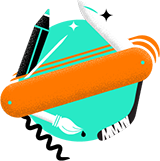Don't Let Good Ideas Get Away
Having a personal grab bag of ideas can preserve your thoughts, and save you from distraction
“Her sister said she had always carried a notebook and was constantly scribbling down her thoughts. She collected the scraps of paper in a bag and emptied them out when she was ready to write.”
“She” is writer Rachell Ingalls. Her sister’s recollection is from a 2019 obituary, published a few weeks after Ingalls passed away at the age 78.
Ingalls was an extraordinary — and extraordinarily overlooked — writer. In 1986, her novella Mrs. Caliban was chosen by the British Book Marketing Council as one of the 20 best novels by living American writers after World War II. You probably haven’t heard of Ingalls, but, if you’re an avid fiction-reader, you’ve probably heard of the other people on that list — Toni Morrison, Philip Roth, John Updike, etc.
And yet, Mrs. Caliban hardly sold. At least, until it was republished in 2017 after the film Shape of Water — to which it bears a startling similarity — won the Oscar for best picture, and ignited interest in the book.
Ingalls was a marvel of writing economy. I have a copy of her book Binstead’s Safari that I flip open when I need to be reminded that my sentences are getting too long. (I’ll stick an example passage in the “P.S.” below this post.)
When I first got interested in Ingalls, I was fascinated to read her advice that writers should "go to literary sources which are not books, such as film and theater."
“A lot of what other people do in their ‘reading time’ I have spent on entertainment," she said, "particularly theater, ballet, and opera.”
Ingalls had a voracious appetite for stories, in all forms, and when they gave her ideas, she’d record them and drop them in her grab bag until it was time to write.
I was reminded of this recently while talking to psychologist Adam Alter (who I interviewed for the last post). For two decades, Adam has been keeping a document in which every time he sees a good idea — whether it be a product, piece of writing, or work of art — he jots down a note about it. The notes are roughly arranged by theme, and he peruses them at random when he feels stuck in his work and needs creative inspiration.
In his new book, Anatomy of a Breakthrough, Adam recommends that everyone stimulate their curiosity by keeping “an ongoing list of facts, ideas, and experiences that puzzle you.”
Science writer Steven Johnson keeps (and re-reads every few months) a “spark file,” which, he says, contains “all my hunches: ideas for articles, speeches, software features, startups, ways of framing a chapter I know I'm going to write, even whole books.”
Dan Pink, another writer I admire, keeps a spark file too. He calls it a “holding pen for your ideas that you want to deal with later.” You don’t want to lose them, but you’re focused on something else at the moment they arise, so also don’t want to be distracted. I have one too. Sort of.
I call mine my “master thought list.” It’s just a document in which I collect quotes, statistics, concepts, questions, thoughts — whatever. I place items that feel related near one another. Above each collection I put what I call a “tag.” A tag is just a title for that group. For example: “design-thinking tag.” And then I’ll write a bunch of words next to the tag that I think I would search if I were looking for this particular group of items. (Examples: “universal design”; “IDEO”; “human-centered design”; “Henry Dreyfuss”; etc.) Eventually, as various tagged groups start to orbit a particular topic, I move them physically closer to one another in the doc.
The result, sometimes, is a sort of storyboard out of which a writing project develops. My first book, The Sports Gene, developed out of my master thought list. I had tags that were basically just lists of topics I’d become curious about while participating in or watching sports. Those ranged from why softball pitchers can strikeout the best Major League Baseball hitters, to whether one’s perception of pain was innate, and whether athletic training could influence it. A lot of those questions revolved in one way or another around the balance of nature and nurture in developing athletic skills. And thus I had a book topic.
These days, I use a master thought list even more once I’ve actually started a project. It’s helpful for that initial idea-storyboarding process, and so that I have a searchable document where I keep track of citations, and that’s peppered with terms I think I’d want to search to find a particular idea. It’s kind of like building a wiki of my own brain, but I’m the only editor.
Whether it’s to organize ideas for a project (me); to have material to turn to for inspiration when you get stuck (Adam Alter); to save idea-sparks without getting distracted by them in the moment (Steven Johnson and Dan Pink); or to create a receptacle of fleeting impressions (Rachel Ingalls), I think having a repository for interesting things you come across is a great idea.
It needn’t be elaborate. Maybe try jotting down things that interest you in the notes app on your phone. Or, if you’re a genius like Rachel Ingalls, apparently you can just toss your ideas in a bag!
Thank you, as always, for reading. If you have anything like a spark file, or master thought list (spark file sounds so much cooler), let me know how you use it in the comments below.
If you enjoyed this post, please share it.
If a friend sent this to you, you can subscribe here 👇. All content is free, and paid subscriptions are voluntary.
Until next time…
David
P.S. The dialog exchange below is from Ingalls’s Binstead’s Safari. (I added notation indicating the speaker.) Millie, a long-neglected wife, is beginning an identity-shift while accompanying her sour-professor husband, Stan, on a research trip to Africa. At a party, Millie imagines aloud donning another woman’s brightly-colored dress. Stan isn't amused. Very quickly, the reader gets a clear picture of this marriage:
Stan: “You sound like fifty wise sayings from Coco Chanel. A dress like that is an anachronism.”
Millie: “I don't understand what you're talking about. The study of paleontology is an anachronism.”
Stan: “Look, Millie, a study of the past is not the same as a fashion that's out of date.”
Millie: “This fashion may be just coming back. You may not have read the right magazines. The woman may be the ace trend-setter of a jet-set you’ve never even heard of. She may at this very moment have a bluebird tattooed on her instep.”
P.P.S. Special thanks to avid Range Widely reader Matt Thomas. After I mentioned my “master thought list” in response to a comment on a post, Matt kept asking about it in the comments. Eventually, I promised him that if I didn’t provide an answer in the comments within the next two posts, then I’d write a post explaining what it is. Here it is, Matt!







I assumed others did this, but I haven't actually known for sure. I keep my notes in Google Keep, and I usually find myself adding content to my notes while reading something else (a book, or an article usually). It's typically only when I'm adding content that I read previous content in my notes, and I'm honestly amazed at some of the thoughts I've had on particular topics. What I've learned is that I have to write down a well-formed thought when I have it because I may not be in the right frame of mind to see it clearly again for a long while (if ever).
Oh my gosh! This was even better than I could've imagined thank you so much, David!! I really love this idea, and it's so interesting to hear that it's a common thing amongst other writers. I've actually started doing something sort of similar recently where I just walk around with a pen and a stack of post its in my pocket. Whenever something interesting happens that I want to think/journal more about later, I'll write it down. My friends have rightfully started to make fun of me for it because I've even taken to writing things down in different colors depending on what category of thought/idea they are. I like it, though, because I feel like I can't remember much in any given moment, but when I write things down, I am the sum of my past selves. Or maybe I'm just nerdy.
Either way, this is all to say that this was very validating to read, and I really appreciate you keeping up your end of the bargain. I liked Ingalls' idea that inspiration should come from other sources besides just reading. I'm curious, have you noticed where your inspiration tends to come from? I imagine it might be different for a fiction writer like Ingalls, but are there any places/outlets/activities/writers that reliably leave you with things to add to your master thought list? And thanks again for doing this. This really made my week :)